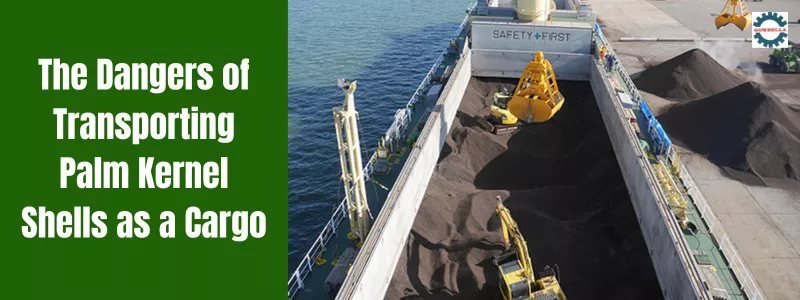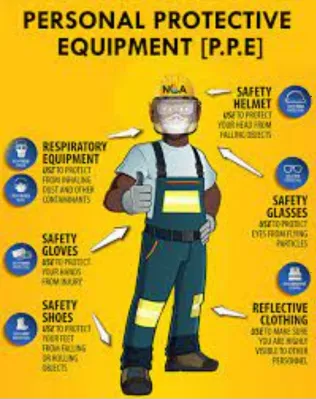-
-
Suite 1, Floor 2, Wing C, Alhaji Adenekan Plaza, Okota Road, Isolo, Lagos State, Nigeria
Blog Details

14
NovThe Dangers of Transporting Palm Kernel Shells as a Cargo
The Dangers of Transporting Palm Kernel Shells as a Cargo
Contents
- 1 The Dangers of Transporting Palm Kernel Shells as a Cargo
- 1.1 Introduction
- 1.2 Are Palm Kernel Shells Dangerous Cargo?
- 1.3 Regulations Around Transporting Palm Kernel Shells
- 1.4 Transporting Palm Kernel Shell and the IMSBC Code
- 1.5 Global Regulations on Transporting Palm Kernel Shells
- 1.6 Legal Consequences of Non-Compliance
- 1.7 Health and Safety Measures When Handling Palm Kernel Shell
- 1.8 Impact of Palm Kernel Shell on the Environment
- 1.9 Conclusion
Introduction
As the global demand for renewable energy sources continues to rise, palm kernel shell (PKS) has emerged as a highly sought-after biomass fuel due to its sustainable and environmentally friendly properties. However, it is crucial to recognize that transporting palm kernel shells comes with inherent risks and challenges that need to be addressed.
In this comprehensive blog post, we will delve into the potential dangers associated with transporting palm kernel shells as cargo, including the risk of combustion, moisture content management, and the impact of handling and storage conditions on their quality. We will also emphasize the significance of implementing effective safety measures and precautions in transporting Palm kernel shells, safeguarding both the cargo and the environment.
By exploring these critical aspects, we aim to provide valuable insights and guidance to industry professionals and stakeholders involved in the renewable energy sector. Together, we can enhance our understanding of palm kernel shell as a biomass fuel and develop strategies to mitigate potential risks, contributing to a safer and more sustainable future.
Are Palm Kernel Shells Dangerous Cargo?
Palm kernel shells are considered dangerous cargo due to several factors. Firstly, their high moisture content and organic nature can lead to spontaneous combustion if not stored or transported properly. Additionally, PKS can release flammable gases, posing a risk of fire or explosion. The fine particles and dust generated during handling and transportation can also be hazardous to health if inhaled.
Regulations Around Transporting Palm Kernel Shells
To mitigate the risks associated with palm kernel shells as a cargo, government regulatory bodies have implemented guidelines and regulations.
The transportation of palm kernel shells (PKS) is strictly regulated to ensure the safety and well-being of crew members, vessels, and the environment. International bodies, such as the International Maritime Organization (IMO) and the International Maritime Solid Bulk Cargoes (IMSBC) Code, have established comprehensive guidelines and regulations specifically tailored for the transportation of solid bulk cargoes, including PKS.
These guidelines cover various aspects, including proper handling, stowage, and documentation requirements, to mitigate risks and ensure smooth and secure transportation operations. By adhering to these regulations, the industry can uphold high standards of safety and environmental protection while facilitating the efficient movement of PKS across different markets.
Transporting Palm Kernel Shell and the IMSBC Code
The IMSBC Code, also known as the International Maritime Solid Bulk Cargoes Code, is a comprehensive set of guidelines that outlines the necessary precautions for the safe transportation of solid bulk cargoes, including Palm Kernel Shells (PKS). These guidelines play a critical role in ensuring the safety of vessels and crew members involved in the transport of these cargoes.
One of the key aspects covered by the IMSBC Code is the proper stowage of solid bulk cargoes, which involves arranging and securing the cargoes in a way that minimizes the risk of shifting, sliding, or collapsing during transit. Additionally, the code provides recommendations for proper ventilation to prevent the accumulation of hazardous gases or the build-up of heat that could lead to combustion.

Moreover, the IMSBC Code also emphasizes the importance of following appropriate handling procedures when dealing with solid bulk cargoes. This includes considerations such as the use of suitable equipment, the implementation of effective communication protocols, and the adoption of preventive measures to mitigate potential risks.
By complying with the regulations outlined in the IMSBC Code, stakeholders involved in the transportation of solid bulk cargoes can significantly reduce the likelihood of accidents, ensuring the safety of personnel and protecting the environment from potential hazards associated with these cargoes.
Global Regulations on Transporting Palm Kernel Shells
Transporting palm kernel shells involves navigating a complex web of regulations that differ from region to region. Let’s take a closer look at the specific regulations in key regions:
- USA: The transportation of PKS in the USA is governed by federal regulations enforced by agencies such as the Department of Transportation (DOT). These regulations address packaging, labeling, and documentation requirements to ensure the safe and efficient transportation of PKS.
- Southeast Asia: Countries in Southeast Asia, such as Malaysia and Indonesia, play a significant role in PKS production and export. These countries have developed regulations to ensure sustainable sourcing, environmentally friendly transportation practices, and compliance with international standards.
- EU: The European Union (EU) has established regulations to promote sustainable and responsible sourcing of biomass, including PKS. These regulations focus on ensuring traceability, minimizing environmental impact, and complying with sustainability criteria such as the EU Renewable Energy Directive.
- South America: South American countries, including Brazil and Colombia, have implemented regulations to regulate the transportation of PKS. These regulations address issues such as packaging, labeling, and documentation requirements, as well as environmental considerations.
Legal Consequences of Non-Compliance
Non-compliance with regulations surrounding transporting palm kernel shells can have severe legal consequences. These may include:
- Fines and penalties imposed by regulatory authorities for violations of transportation regulations.
- Legal action and lawsuits are filed by affected parties, such as workers or communities, in the event of accidents or environmental damage caused by non-compliance.
- Damage to reputation and loss of business opportunities for companies involved in the transportation process.
To mitigate these risks, it is crucial for companies and individuals involved in the transportation of PKS to stay updated on the latest regulations and comply with them diligently.
Health and Safety Measures When Handling Palm Kernel Shell
Transporting palm kernel shells requires strict adherence to comprehensive health and safety measures to effectively protect the well-being of workers, communities, and the environment. These measures encompass a range of protocols aimed at mitigating potential risks and ensuring a safe transportation process.
Firstly, proper handling and storage procedures are implemented to minimize the risk of fires and explosions. Stringent guidelines are followed to ensure the safe and secure storage of PKS, reducing the possibility of any hazardous incidents.
Secondly, compliance with guidelines for personal protective equipment (PPE) is of paramount importance. All workers involved in the transportation of PKS are equipped with appropriate PPE, such as safety gloves, goggles, and masks, to safeguard them from potential hazards and promote their well-being.

Moreover, regular inspections and maintenance of transport vehicles are carried out to ensure their roadworthiness and prevent any potential accidents. This includes routine checks of tires, brakes, and other critical components, as well as adherence to maintenance schedules to address any potential issues promptly.
Additionally, the implementation of emergency response plans is a crucial aspect of ensuring the safety of all involved. These plans outline detailed procedures to be followed in the event of any incidents during transportation, such as spills, leaks, or accidents. By having robust emergency response plans in place, swift and effective actions can be taken to minimize the impact of such incidents and protect the environment and surrounding communities.
By rigorously adhering to these comprehensive health and safety measures, stakeholders in transporting palm kernel shells can significantly minimize risks and ensure the well-being of all involved parties. These measures not only prioritize the safety of workers but also demonstrate a commitment to environmental sustainability and community welfare.
Impact of Palm Kernel Shell on the Environment
Palm kernel shells (PKS) are a valuable renewable energy source, derived from the extraction of palm oil. However, it’s important to consider the potential environmental implications associated with their usage. Improper disposal or mishandling of PKS can result in air and water pollution, affecting ecosystems and human health.
To mitigate these risks, it is crucial to implement proper waste management practices. One approach is to utilize PKS for sustainable purposes, such as biomass energy production or as a raw material for manufacturing processes. Additionally, ensuring responsible disposal or recycling methods are in place can further minimize the environmental impact.
By taking these measures, we can harness the benefits of palm kernel shells while minimizing their potential negative effects, promoting a more sustainable and eco-friendly approach to resource utilization.
Conclusion
Understanding the risks associated with transporting palm kernel shells as cargo is of paramount importance for logistics companies, government regulatory bodies, and all stakeholders involved. Compliance with regulations, proper safety measures, and responsible handling are essential to ensure safe transportation. Additionally, it’s crucial to recognize the environmental impact of palm kernel shell usage and take steps to minimize any negative consequences. By prioritizing safety and environmental responsibility, we can harness the potential of palm kernel shells while mitigating its risks.
Author's Details
gombella
Other posts by gombella